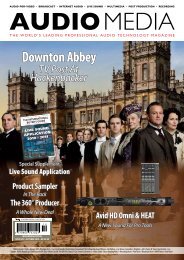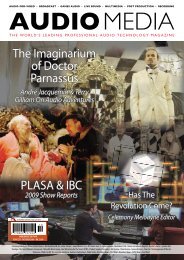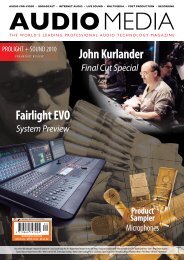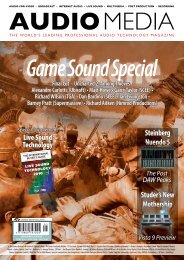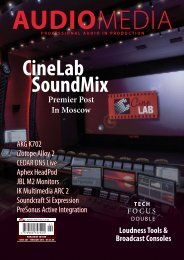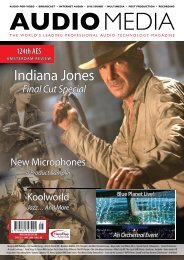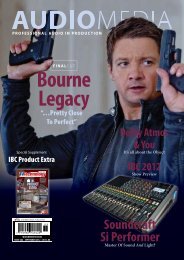Prism Sound Orpheus - Audio Media
Prism Sound Orpheus - Audio Media
Prism Sound Orpheus - Audio Media
- No tags were found...
You also want an ePaper? Increase the reach of your titles
YUMPU automatically turns print PDFs into web optimized ePapers that Google loves.
05|08AMSRINTERPOLLIVEMARK DAVIE takes a ride withInterpol’s FOH engineer,Harley Zinker. Just don’ttouch his water.Slow and trembling, like a junky trying to build a houseof cards, a hand moves deliberately over the crowdbarrier towards a stash of bottled water near the FOHmix position, its path closely monitored by two dilatedpupils the size of ten cent pieces. “Hey! … Hey! Get yourhands away from my stuff!” bellows Harley Zinker, FOHengineer for Interpol. Harley’s warnings become increasinglydire until the perpetrator staggers away with security on histail. Apparently he doesn’t make it very far: one of Harley’sfriends reports with a chuckle moments later that“he spewed his guts out just round the corner”. “Well, heshould learn how to handle whatever he was on,” is Harley’sfrank observation. Too right. The other punters agree withnodding heads. After all, the gig hasn’t even started yet.Harley is an entirely good-humoured man. But thisencounter is a glimpse of how seriously he takes the art ofsound. There’s no way Harley’s going to let some ‘off-hisface’punter get too close to the gear he needs to do his job,especially when that gear relies on an iLok jutting out rightnext to that bottle of water.A couple of hours prior, sitting in his hotel roomoverlooking the Melbourne CBD, his enthusiasm for soundis obvious. In the past 10 years he’s circled the globe touringwith the likes of The Strokes, The Killers, Radio 4, and LeTigre, and he loves it. But the Harley story begins in EMI’smailroom in New York.Mail Order <strong>Sound</strong>Harley’s is an interesting tale, one that can be pinpointedto a singular ‘turning of the tides’ encounter. It’s the late’90s, the halcyon days of the New York music scene hadcome to an end and major labels were taking a dive.Like many, Harley reluctantly turned his back on his studiowork to take a job running the post room at EMI records inNew York. Before e-mail took over, the mailman was at thehub of operations, and Harley met his fair share of labeltypes. One of those – an A&R guy for Capitol (a subsidiaryof EMI) by the name of Dave Ayers – ‘discovered’ Harley inthe way only A&R guys can. “You have to get out of here,”Dave decided. “We know you’ve worked in studios, weknow you’re pretty smart, so we want you to come ontour and do the sound for this band we’ve just signed.”“Okay,” was Harley’s reply; an uncomplicated responsethat’s opened doors for him around the world.Having never been on tour before, and never mixed a liveband, the label packed him off to the now-defunct Brownies,a little 200-capacity club in New York, for a two-day bootcamp on live mixing. At the end of those two days, Brownieswound up offering him a job too. So far, so good. The nextday, he set off on his first tour with recently signed band,Verbena. Returning from the tour, Harley started mixingsound at Brownies and took any freelance gig that camehis way, working his way through every club across the city,whether people paid him or not – if it was a gig, he’d takeit. Eventually, his relentless drive paid off, and he left themailroom and took up sound as his full-time gig.INTERPOL SURVEILLANCEOne of the many bands that graced the Brownies stagewas Interpol. The relationship started off as the occasionalrequest for a show here and there, ‘Okay’; then across theocean to London for a few days, ‘Okay’; then a tour acrossthe US for three weeks. ‘Okay’ was Harley’s ready reply.No one quite knew how successful that tour would be,and three weeks snowballed into 17 months of solid workoff the back of the first album. And, in a sweet twist ofserendipity, just three days prior to heading out on tour,Brownies closed.Mark Davie: How did you cope with that change frombeing a house guy at Brownies to being on the road andconstantly having to adapt to new environments?Harley Zinker: It was a learning process and it still is tosome degree. In the beginning the band never playedthe same size venue twice. We went from 350-capacityclubs where I was doing monitors and FOH from thesame board, to 1100-capacity venues with proper PAs.So each step up was just a natural progression. But Iwas up for the challenge, and they were up for allowingme to be up for the challenge. I know many bands thatwould have taken on a more experienced person, butI’ve been fortunate in that regard – they’ve been prettytrusting and allowed me to do my thing.MD: R i g h t , b e c a u s e h o w e l s e d o y o u g e tthat chance?>76AUDIO MEDIA MAY 2008



